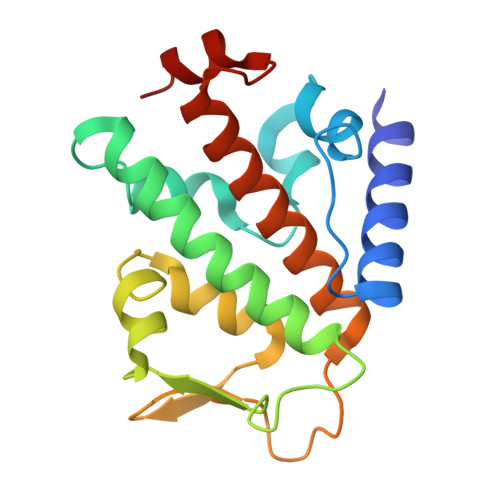Repurposing Tolfenamic Acid to Anchor the Uncharacterized Pocket of the PUB Domain for Proteolysis of the Atypical E3 Ligase HOIP.
Zhong, F., Zhou, Y., Liu, M., Wang, L., Li, F., Zhang, J., Han, Z., Shi, Y., Gao, J., Ruan, K.(2024) ACS Chem Biol 19: 2469-2476
- PubMed: 39513479
- DOI: https://doi.org/10.1021/acschembio.4c00541
- Primary Citation of Related Structures:
8Z30, 8Z36 - PubMed Abstract:
The E3 ligase HOIP is vital for the NF-κB pathway and is implicated in cancer and immunity. However, it remains challenging to achieve high selectivity by directly targeting the conserved catalytic RBR domain of HOIP. Herein, we identified four low-molecular-weight compounds that bind to an uncharacterized pocket of the HOIP PUB domain (HOIP PUB ). The complex structure facilitated the discovery of the first single-digit micromolar ligand of HOIP PUB , tolfenamic acid, which exhibited over 30-fold selectivity due to the low sequence identity of the uncharacterized pocket of HOIP PUB . Although tolfenamic acid did not block the substrate recognition and linear ubiquitination activity of HOIP, a ligand of the uncharacterized PUB pocket of HOIP (LUPH), by chemical linking pomalidomide with tolfenamic acid, degraded HOIP, reduced NEMO ubiquitination and p65 phosphorylation, and eventually inhibited NF-κB activation and breast cancer cell proliferation. Our work proposes an alternative strategy to target the nonfunctional pocket of the PUB domain with high sequence diversity to promote HOIP degradation, rather than targeting the conserved RBR domain to block the catalytic function of HOIP.
Organizational Affiliation:
The First Affiliated Hospital & School of Life Sciences, Ministry of Education Key Laboratory for Membrane-Less Organelles & Cellular Dynamics, Hefei National Research Center for Interdisciplinary Sciences at the Microscale, Biomedical Sciences and Health Laboratory of Anhui Province, Center for Advanced Interdisciplinary Science and Biomedicine of IHM, Division of Life Sciences and Medicine, University of Science and Technology of China, Hefei 230027, China.















